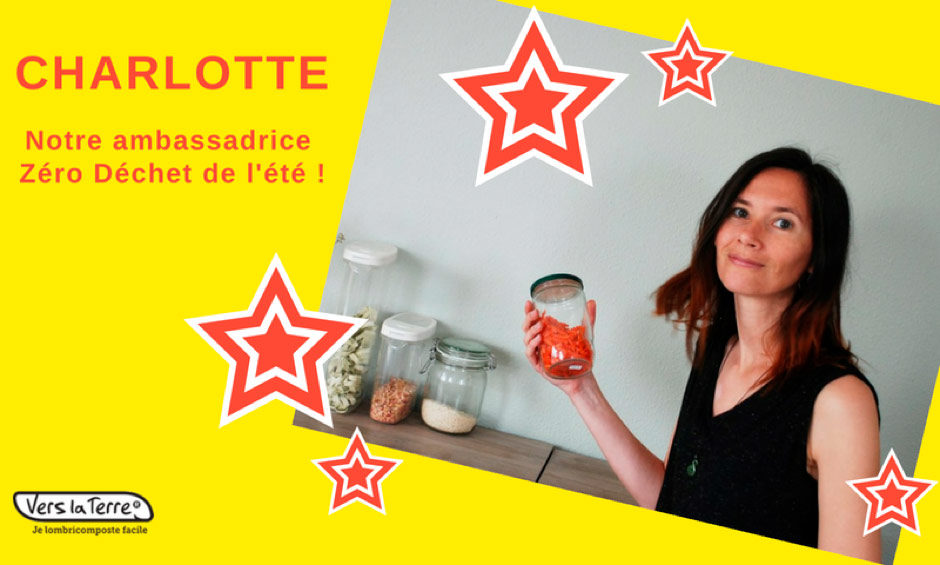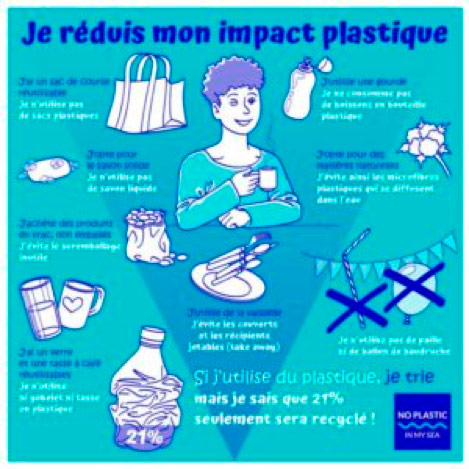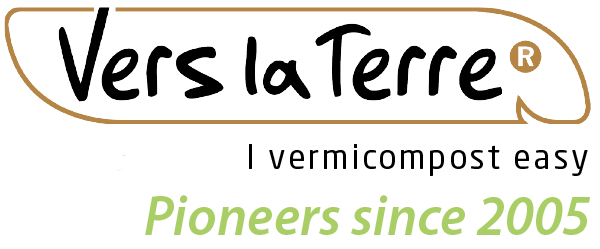
Charlotte is a blogger, an active member of the Montpellier Zéro déchet association, a yoga enthusiast and an exceptional traveler! Through her portrait, we wanted to introduce you to a young woman who inspires us and who is full of precise, well-informed advice on how to go Zero-Waste this summer! She advises us on books to read and films to see before taking the plunge, and tells us how she got the zero waste bug.
Hello ! My name's Charlotte, I'm 35, I've got a degree in marketing and I've mainly worked in communications and advertising in the outdoor and web fields, all interspersed with long backpacking trips. So, as you can imagine, I love to travel, and I'm passionate about yoga and spirituality.
Today, I combine my passions with one main theme, which is awareness (of ourselves, our surroundings and our environment) by accompanying entrepreneurs and ethical organizations towards a better understanding of themselves, enabling them to align their values with their actions and move forward with their projects as serenely as possible.
Involved in community work for over 2 years, I'm currently an active member of the Montpellier Zéro Déchet association, which promotes waste reduction. I'm also launching virAges with a friend. It's a project to support festivals wishing to commit to an eco-responsible approach.
I also have a blog and a Facebook page on which I share ideas and thoughts on themes that are dear to me. It's called Just Bulle it.
1- Thank you Charlotte and welcome to our blog! We wanted to give you the opportunity to speak, because you're one of those people who are committed to what's known as Zero Waste. Can you tell us about this approach and how you put it into practice in your daily life?
As a child, I was brought up with a certain sensitivity to the environment, or rather with an awareness of our impact on the planet. This has certainly influenced the way I live and consume today. For a long time, my only environmental action was to carefully sort my garbage and not throw my cigarette butts on the ground. Then I started to buy organic and then local produce. But one day I realized just how complex and energy-consuming recycling can be. For us at home (we never really know what to sort), but also when the waste arrives at the sorting areas. Most of the time, waste that's supposed to have already been sorted has to be sorted a second time, because a lot of what we throw away isn't recyclable! This is mainly due to individual errors within households (often due to a lack of information), as well as different instructions at different sorting centers. Just imagine the monetary and energy cost of re-sorting!
As for plastic waste, it's important to know that not all of it can be recycled (some is mixed with resins and colorants that make it very difficult and costly to recycle), and only 20 to 30% of that which can be recycled is, with a large proportion of this in Asia! Not to mention the fact that plastic can't be recycled endlessly!
When I realized all this, I decided to get to the root of the problem and change my consumption habits.
In concrete terms, here's how I organize myself:
- i do almost all my grocery shopping in bulk with my fabric bags and jars,
- i have a vermicomposter in my apartment to avoid throwing my organic waste in the garbage can and to have home-made fertilizer for the plants on my balcony
- i buy a lot of second-hand clothes, furniture and tools,
- and when I need to get around town, I do it all by bike!
2 - Today, you're an active volunteer with Montpellier Zéro Déchet. Can you tell us about the origins of the association, the actions in which you are particularly involved, and future projects?
Montpellier Zéro Déchet has been in existence for over 2 years. Starting out as a local group, it became a fully-fledged association less than a year ago.
Attached to Zéro Waste France (https://www.zerowastefrance.org/fribourg-guerre-gobelets-jetables-declaree/), its aim is to raise awareness of the need to reduce waste by proposing concrete solutions, and to support individuals and local authorities who wish to put this approach into practice.
There are many ongoing projects, and each volunteer is free to propose others and implement them independently at any time.
Currently, one of the projects I'm working on is to meet with local shopkeepers to find out if they'd be willing to serve their customers in containers they've brought along with them to make their purchases (a glass box for cheese or meat, for example). When shopkeepers are involved, we stick a sticker in their window to specify the shop's approach and give visibility to this commitment. At the same time, we're working on a map of the city of Montpellier to locate all the retailers involved in this initiative.
A small group of volunteers is working with families in Prades-le-Lez (34) on a "zero waste family" challenge. This project, for example, is an initiative supported by the town council. Another group is in contact with Montpellier Méditerranée Métropole to try and reduce the use of plastic containers in canteens.
We regularly organize or co-organize beach clean-ups and, last but not least, every month we organize meetings to enable us to exchange ideas with as many people as possible: one month it's a Zero Waste apéro, the next an information meeting on the association's actions.
3 - The Zero Waste France association is organizing the second edition of the Zero Waste Festival at the Cabaret Sauvage in Paris on June 28, 29 and 30*. How do you think this event can help people get started?
This kind of event gives committed people the keys to raising awareness among those around them. It also gives ideas for concrete actions that can quickly be implemented at home, at work, or in the community. The kind of action that will have a noticeable impact very quickly.
It also enables you to meet other people who are in the same frame of mind, creating a much-needed community of mutual support. Sometimes, you can feel a bit alone with your convictions!
And for those for whom changing their consumption habits seems very difficult, if not impossible, and who think it will have little impact, an event like this shows concretely what it changes, that it's possible, not so complicated and fun!
And yes, we mustn't forget to enjoy ourselves when we decide to take this kind of step. It's essential if you are to succeed in implementing long-term changes in your lifestyle and consumption habits.
Guilt isn't constructive, and it's okay not to be perfect!
For example, I love ice cream. But I don't have an ice cream machine to make my own. So when I'm in the mood for ice cream, I don't stop myself from eating it, even if it's packaged! I also very often make my own cookies, but last weekend I was out of town and was quite happy to buy some from the supermarket.
You have to remember that we humans work on rewards, not frustration. And if you're frustrated, you don't make people want to commit to zero waste, and that makes it unattainable and no fun at all!

4 - There's a lot of talk about the No Plastic movement at the moment, with plastic attacks in supermarkets, and more recently the No Plastic Challenge. Have you taken part in any such actions, and how can they help raise awareness more widely ?
These actions make people really aware of the amount of packaging used for their everyday products.
It's good because campaigns like the No Plastic Challenge, for example, are highly visual and make a real impact. If it could make manufacturers think again, if only for the sake of their brand image, that would be interesting!
Personally, I don't shop in supermarkets any more, so I didn't take part in the Attac plastic campaigns. But for me, any action in this direction is positive.
I'm all for setting an example: "do, show and answer questions when you're asked". That way, you'll take a lot of people with you!
5 - What are your top 5 tips for someone who wants to go Zero Waste?
- Tell yourself that you don't have to change everything right away.
Have achievable goals and stay consistent by finishing what you already have in your kitchen, for example. Throwing everything out and starting from scratch because it's faster doesn't necessarily make sense, even if I can understand the craze.
- Inspect your garbage can.
It's a good starting point to see what our biggest waste-generating item is.
- Join discussion groups on social networks.
When you're starting out, you often have lots of questions. Fortunately, others have gone before you and you'll find answers quickly and easily in these groups.
- If you have children, get them involved!
Make your own washing powder, discover how a vermicomposter works or think together about how to replace the disposable gourd of compote at snack time. It's a great way to get the whole family involved, and make faster progress.
- And don't forget to treat yourself!
6 - Do you have any books you'd recommend for those interested in the Zero Waste approach and anything else to do with more rational consumption patterns?
In terms of books, I'd definitely recommend the Zéro Déchet (almost) Family books. They're full of ideas and tips that are easy to implement at home, illustrated and fun. Great for adults and kids alike!
There's also the blog of the same name, as well as many other blogs, such as Camille se lance, Consommons sainement and Ça commence par moi, which don't just focus on waste reduction, but provide a wealth of ideas and food for thought on how to adapt your lifestyle to your values.
For those who have trouble reading, there are also interesting documentaries such as "Ma vie zéro déchet" or "No impact man", as well as YouTube channels, so don't hesitate to look around!
We'd like to thank Charlotte for this interview, and hope that all her advice and commitments have inspired you! You've got all summer to get started!
Would you like to talk to me about your commitments to the planet, a new way of living that's kinder to the environment, or just something that inspires you in line with the values promoted by Vers La Terre?
Write to me at lise@verslaterre.fr!
*Vers La Terre supports the second edition of the Zero Waste Festival! You'll find worm composting workshops led by our friend Thierry Sin, master composter, on all three days of the event. Click here for the full program.

Comments (0)